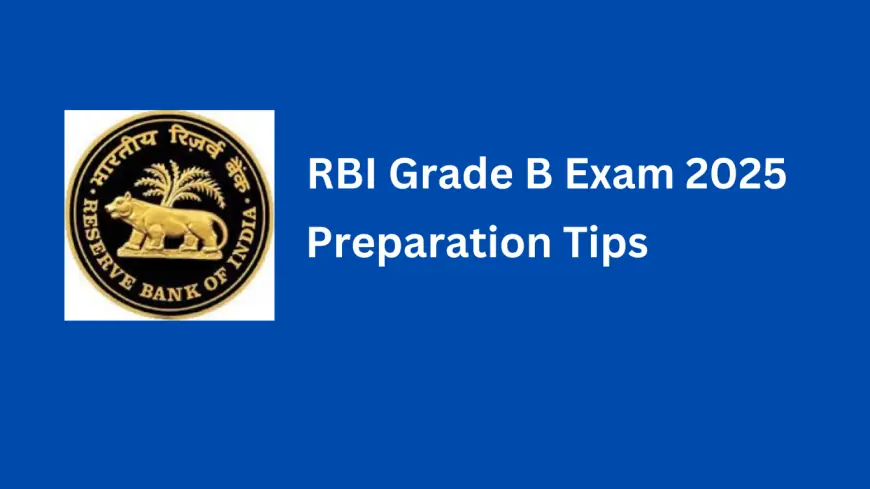How to Prepare for RBI Grade B Exam in 2025
Learn how to prepare for the RBI Grade B Exam 2025 with expert tips, a detailed syllabus breakdown, and a strategic plan to ace each phase of this prestigious banking exam.

The Reserve Bank of India (RBI) conducts the RBI Grade B Exam every year, which is one of the most prestigious and sought-after exams for aspirants aiming to secure a stable and respected government job in the banking sector. Preparing for this exam requires a well-structured strategy, an understanding of the exam pattern, and a clear grasp of the RBI Grade B Syllabus. If you are planning to appear for the exam in 2025, this guide will help you with a step-by-step preparation plan.
Understanding the RBI Grade B Exam
The RBI Grade B Exam is conducted in three phases:
Phase 1 (Preliminary Exam): This is an objective test covering General Awareness, Quantitative Aptitude, English Language, and Reasoning Ability.
Phase 2 (Mains Exam): This phase includes both objective and descriptive tests covering Economic and Social Issues (ESI), Finance and Management (F&M), and English (Descriptive).
Interview: Candidates who qualify in Phase 2 are shortlisted for an interview.
Each phase is crucial, and candidates must focus on clearing one stage at a time to move forward.
RBI Grade B Syllabus
Before starting your preparation, it is essential to understand the RBI Grade B syllabus thoroughly. Here’s a detailed breakdown:
Phase 1 Syllabus
General Awareness (GA):
Current Affairs (national and international)
Banking and financial awareness
RBI-related news and updates
Reports and schemes by RBI, IMF, and World Bank
Static GK (e.g., history, geography, sports, awards)
Quantitative Aptitude:
Data interpretation (DI)
Simplification and approximation
Profit and loss, percentages, and ratio
Probability and permutations
Time, speed, distance, and work
English Language:
Reading comprehension
Sentence correction and error spotting
Fill in the blanks
Cloze tests
Para jumbles
Reasoning Ability:
Puzzles and seating arrangements
Blood relations
Syllogisms
Coding-decoding
Input-output
Phase 2 Syllabus
Economic and Social Issues (ESI):
Indian economy and planning
Inflation, poverty, and unemployment
Social structure in India
Government schemes and policies
International economic organizations
Finance and Management (F&M):
Financial systems in India
Basics of accounting
Corporate governance
Human resource development
Leadership and motivation theories
English Descriptive Test:
Essay writing
Precis writing
Reading comprehension
Step-by-Step Preparation Plan
1. Understand the Exam Pattern and Syllabus
Begin your preparation by familiarizing yourself with the exam pattern and syllabus. Make a detailed list of topics for each section, and prioritize them based on your strengths and weaknesses.
2. Create a Study Plan
Divide your preparation into daily, weekly, and monthly targets. For example:
Spend 2-3 hours daily on Phase 1 topics like Quant, Reasoning, and General Awareness.
Dedicate at least 2 hours daily to Phase 2 subjects like Economics, Social Issues, and Finance.
Reserve one day per week for revision.
3. Focus on General Awareness
General Awareness is a scoring section in Phase 1. To excel:
Read newspapers daily (e.g., The Hindu, Indian Express).
Follow monthly current affairs magazines or apps.
Stay updated with RBI circulars, reports, and policy changes.
4. Strengthen Your Quantitative Aptitude and Reasoning
These sections require practice.
Solve 10-15 questions daily from each topic.
Use books like Quantitative Aptitude by R.S. Aggarwal and A Modern Approach to Verbal and Non-Verbal Reasoning by R.S. Aggarwal.
Practice data interpretation sets regularly.
5. Improve English Proficiency
For both Phase 1 and Phase 2:
Develop a habit of reading editorials and opinion columns.
Practice mock tests focusing on reading comprehension and grammar.
For descriptive writing, practice essays and precis weekly.
6. Master Economic and Social Issues (ESI)
ESI is a core subject in Phase 2.
Study topics like inflation, poverty, and demographics.
Refer to standard books like Indian Economy by Ramesh Singh and NCERT Economics for conceptual clarity.
Make notes on government schemes and policies.
7. Prepare for Finance and Management (F&M)
Finance and Management is another crucial subject for Phase 2.
Use books like Principles of Management by L.M. Prasad for management topics.
Study the basics of finance, including banking systems and accounting.
Understand RBI’s functions and its role in the Indian economy.
8. Practice Descriptive Writing
The descriptive English test in Phase 2 requires strong writing skills.
Practice essays on economic and financial topics.
Summarize newspaper articles for precis writing practice.
Time yourself to improve speed and accuracy.
9. Take Mock Tests Regularly
Mock tests are essential for understanding the exam pattern and improving time management.
Start with sectional tests for each topic.
Gradually attempt full-length tests for both Phase 1 and Phase 2.
Analyze your performance, identify weak areas, and revise accordingly.
10. Revise Consistently
Regular revision is crucial for retaining what you’ve learned.
Revise your notes weekly.
Use flashcards or apps for quick recall of facts and formulas.
Update your current affairs knowledge daily.
Resources for RBI Grade B Exam Preparation
Books:
Quantitative Aptitude by R.S. Aggarwal
Indian Economy by Ramesh Singh
Principles of Management by L.M. Prasad
Online Resources:
RBI’s official website for updates and circulars
YouTube channels offering free video lectures
Mock test platforms
Magazines and Newspapers:
The Hindu or Indian Express for daily news
Economic and Political Weekly for in-depth articles
Tips to Stay Motivated During Preparation
Set Realistic Goals: Don’t overwhelm yourself; tackle one topic at a time.
Join Study Groups: Discussing topics with peers can clarify doubts and boost confidence.
Take Breaks: Avoid burnout by taking short breaks after every study session.
Stay Positive: Remember, consistent effort is the key to success.
Conclusion
Preparing for the RBI Grade B Exam in 2025 requires dedication, hard work, and a strategic approach. Understand the syllabus, create a robust study plan, and practice regularly to achieve your goal. Focus on clearing each phase step by step, and don’t hesitate to seek guidance if needed. With the right preparation and determination, you can secure this prestigious position and build a successful career with the Reserve Bank of India.












